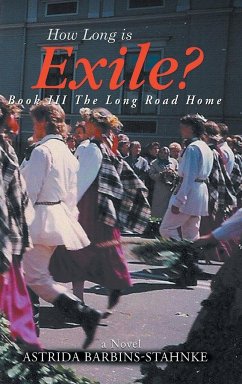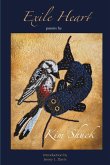At the end of Book I How Long is Exile? The Song and Dance Festival of Free Latvians, widowed Milda Arajs had taken a new direction in her life. She had decided to break solidarity with her mainstream ethnic community and make good her promise to her daughter Ilga that they would make a "pilgrimage" to Soviet Latvia at Christmas time (1983) and welcome the baby Krijanis, born to American Mara and Latvian Igors, as the symbol of a new era. Also, Milda had chosen to give herself to Peteris Vanags, the one-armed veteran she encountered in the Esslingen DP camp after the war. (Story in Book II: Out of the Ruins of Germany.) They married shortly before the momentous trip, and soon thereafter Milda joined him in Washington, D.C. For a decade they lived happily, making up for lost years of forbidden longing and desire until the Soviet Union fell, and the Kingdom of Exile felt the shocks and aftershocks. Unbeknown to herself, Milda's Christmas trip behind the Iron Curtain, with all its revalations, was her first step on her Long Road Home. Also, that trip at the height of American women's liberation movement, marked her adult coming of age and becoming the ruler of her life. Released from domestic bonds, she struck out on her own and challenged her mind to higher things. When Peter, in the late 1980s, was asked to join Radio Free Europe in Munich, Milda saw her Road clearly winding its way back to Latvia. This, naturally threatened the marriage. Slowly, almost imperceptibly, the Road become bumpy, even trecherous. Afraid and out of step, Peter seemed to lag behind, while Milda hurried forward now that the iron curtain was swept away. With firm steps she returned to her homeland; she reunited with her sister Zelda and reclaimed their parents' apartment. Peter complied and came up with the money, but, as if lost, he often went off by himself, afraid of being watched and pursued until he could not walk anymore. After his death and after the guarded secrets were revealed, Milda took her last steps on The Long Road Home alone. Exile was over, but the sense of exile was imbedded in Milda's mind forever, and it was heavy. She felt the weight most poignantly as she watched fireworks grace the skies at elaborate festivals, where strangers celebrated, frolicking and singing to her unknown songs, and young people rush about in search for passages to new lands, where the grass seemed greener and fame and fortune beckened from clouds with silver linings. As a participant in that, so called Exile State, I began writing my version of the experience after the Milwaukee festival, filtering it through the consciousness of my main character Milda Berzi¿a-Arajs, who, coming out of mourning for her husband Karlis Arajs, arrives at the festival, ready to turn a new leaf in her life. During the four days with like-minded people, interesting events, and common recollections of her childhood, the war and post-war experiences in a displaced persons' camp flash before her in a swirling kaleidescope and, at the end, throws her in the direction she did not plan to go. Book III captures the mood after the fall of the USSR. The ethnic communities the Kingdom of Exile is shaken, and the people awake as if from a deep sleep. Milda suddenly becomes active; she makes crucial decisions and switches from an outdated romantic into a realist as she returns home, meets her estranged sister and the country she had left behind. As she tries to find her place in it, she understands that exile is a state of mind; it is a state where half the world's population lives like she uprooted by tyranny and wars. Yet she and other displaced persons go on living and finding pleasure in art, poetry, song, and in each other, though with a sad, melancholy smile.
Hinweis: Dieser Artikel kann nur an eine deutsche Lieferadresse ausgeliefert werden.
Hinweis: Dieser Artikel kann nur an eine deutsche Lieferadresse ausgeliefert werden.









